初衷
本人最近一直在研究小程序,一个偶然的机会发现了mpvue框架,刚好本人对vue十分喜爱,就决定入坑了。曾经在掘金看过一个仿旧版滴滴的小程序,感觉挺不错的,但它是基于原生小程序的,所以就决定花了一段时间用mpvue进行重写。下面就开始正餐了。
效果图
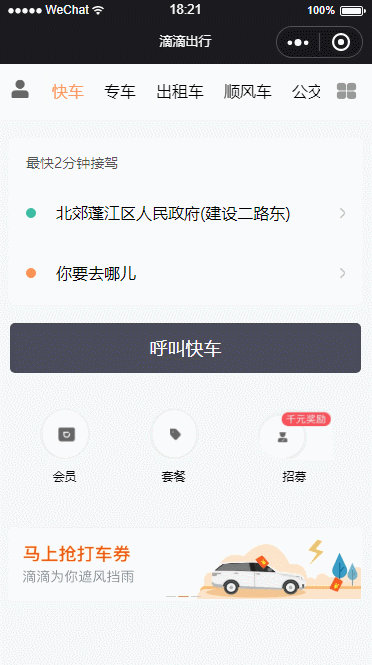
目录结构
┣━ api # 存放网络请求相关
┣━ common ●
┣━ constant //常量
┣━ css //weui.css
┣━ less //通用less样式与变量
┗━ lib //第三方库 qqmap-wx-jssdk.js
┣━ components ● 抽取出来的组件
┣━ addressList.vue
┣━ common-footer.vue
┣━ driver-header.vue
┣━ loading-sprinner.vue
┣━ search-bar.vue
┗━ star.vue
┣━ pages ● 页面
┣━ cars //选择车
┣━ cityChoose //选择城市
┣━ destination //选择目的地
┣━ evaluation //评价
┣━ index //主页面
┣━ login //登录
┣━ orderCancel //订单取消
┣━ orderClose //订单关闭
┣━ orderService //订单服务
┣━ orderWhy //询问原因
┣━ starting //选择出发地点
┗━ wait //等待
┣━ store ● 存放vuex相关
┣━ index.js
┣━ mutation-types.js
┣━ mutations.js
┗━ state.js
┣━ utils 工具类
┣━ App.vue
┣━ main.js
┗━ static # 静态资源,存放图片vuex数据
const state = {
curNavIndex: 0, //当前头部导航索引
phone: '', //登录号码
curCity: '', //当前所在的城市
startPlace: '出发地', //出发地
startFormattedPlace: '', //更具人性化的描述的出发地
startPosition: [], //包含startLatitude和startLongitude
destination: '你要去哪儿', //目的地
endPosition: [], //包含endLatitude和endLongitude
driver: {}, //司机信息 包含Cartnumber,cart,id,name,stars
cost: 0 //花费
}功能详情
头部导航自动滑动
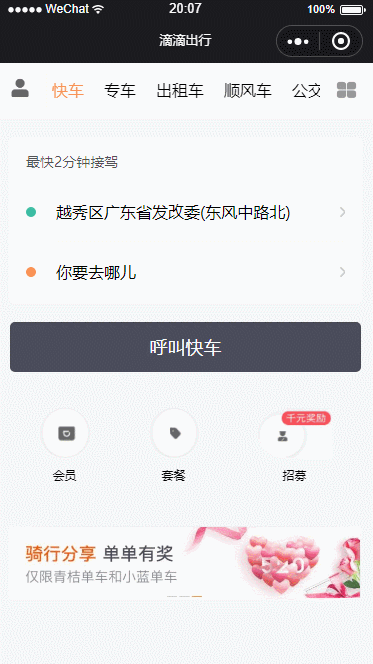
为了让头部导航点击时能自动滑出,滑动swiper的同时头部导航跟着滑动,在cars页面选中车时回退到index页面时头部导航自动滑动,我在vuex中维护了一个索引值curNavIndex。根据不同的curNavIndex对scroll-view设置不同的scroll-left值。
那么如何设置准确的scroll-left值呢?
微信小程序无法进行Dom操作,所以无法动态拿到元素宽度。所以我根据头部导航每项的宽度维护了一个数组navOffsetArr
//两个字宽度+2*margin 也就是 32+10*2 = 52
const NAV_SMALL_WIDTH = 52;
//三个字宽度+2*margin 也就是 48+10*2 = 68
const NAV_BIG_WIDTH = 68;
this.navOffsetArr = [
0,
0,
NAV_SMALL_WIDTH,
NAV_SMALL_WIDTH * 2,
NAV_SMALL_WIDTH * 2 + NAV_BIG_WIDTH,
NAV_SMALL_WIDTH * 2 + NAV_BIG_WIDTH * 2,
NAV_SMALL_WIDTH * 3 + NAV_BIG_WIDTH * 2,
NAV_SMALL_WIDTH * 4 + NAV_BIG_WIDTH * 2
]获取索引值
computed: {
...mapState([
'curNavIndex'
])
}watch里监听索引值,当curNavIndex改变时,拿到不同的navScrollLeft值
watch: {
curNavIndex(newIndex){
this.navScrollLeft = this.navOffsetArr[newIndex]
}
}最后将scroll-left与navScrollLeft绑定,从而实现自动滑动
<scroll-view
class="nav"
scroll-x="true"
scroll-with-animation="true"
:scroll-left="navScrollLeft">
......
......
</scroll-view>首页自动保存位置信息
在进入index首页的时候,就会自动将当前城市,当前经纬度,当前地址存入state中作为出发点信息。这里接入了腾讯地图api,还是比较方便的。
wx.getLocation({
type: 'gcj02',
success: (res) => {
reverseGeocoder(qqmapsdk, res).then(res => {
this.saveStartPlace(res.result.address)
this.saveFormattedStartPlace(res.result.formatted_addresses.recommend)
this.saveCurCity(res.result.address_component.city)
})
this.saveStartPosition([res.latitude, res.longitude])
}
})mapMutations
methods: {
...mapMutations({
saveCurNavIndex: 'SET_CUR_NAV_INDEX',
saveStartPlace: 'SET_START_PLACE',
saveFormattedStartPlace: 'SET_FORMATTED_START_PLACE',
saveCurCity: 'SET_CUR_CITY',
saveStartPosition: 'SET_START_POSITION',
saveCost: 'SET_COST'
})
} 其中reverseGeocoder()就是一个位置转换为地址的函数,是对qqmapsdk.reverseGeocoder()进行了一次封装
function reverseGeocoder(qqmapsdk, {latitude, longitude}) {
return new Promise((resolve, reject) => {
qqmapsdk.reverseGeocoder({
location: {
latitude: latitude,
longitude: longitude,
},
success: (res) => resolve(res),
fail: (res) => reject(res)
})
})
}这样当我们进入index首页的时,就可以在Console中就看到数据成功保存到vuex里

选择出发点
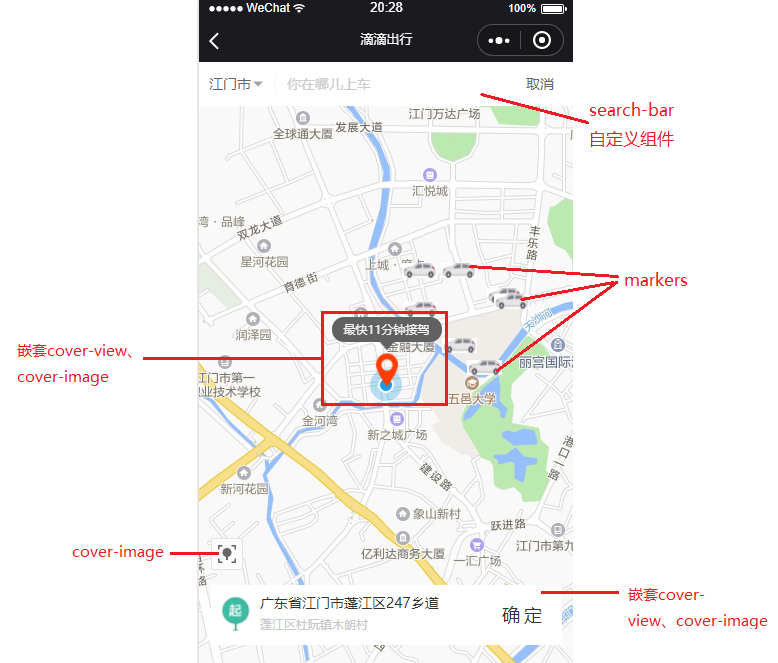
在mpvue中使用map组件时会有一些坑,这里先缓一缓,坑稍后再说。
地图map
<map class="map-didi"
id="map-didi"
:latitude="latitude"
:longitude="longitude"
:markers="markers"
@regionchange="regionChange"
@begin="begin"
@end="end"
show-location
>
...
</map>初始化地图时将地图中心移动至startPosition,如果startPosition不存在,就将地图中心移动至wx.getLocation()获取的当前位置坐标
initLocation(){
if (this.startPosition.length) {
this.latitude = this.startPosition[0]
this.longitude = this.startPosition[1]
} else {
wx.getLocation({
type: "gcj02",
success: (res) => {
this.longitude = res.longitude
this.latitude = res.latitude
}
})
}
}采用随机数据模拟附近的车,然后添加到this.markers中,车的图标根据curNavIndex动态设置,这样就可以在选择不同的服务时展示不同的车图标
this.markers = []
const carNum = getRandomNum(3, 8)
for (let i = 1; i <= carNum; i++) {
// 定义一个车对象
let car = {
id: 0,
iconPath: "/static/img/car/cart1.png",
latitude: 0,
longitude: 0,
width: 35,
height: 15
}
//随机值
const lon_dis = (Math.ceil(Math.random() * 99)) * 0.00012;
const lat_dis = (Math.ceil(Math.random() * 99)) * 0.00012;
car.id = 2 + i
car.latitude = this.latitude + lat_dis
car.longitude = this.longitude + lon_dis
car.iconPath = `/static/img/car/cart${this.curNavIndex + 1}.png`
this.markers.push(car)
}地图中心的红色定位图标以及接驾时间的文字是用cover-view包裹cover-image实现
<cover-view class="center-marker">
<cover-view class="text-center">最快{{minutes}}分钟接驾</cover-view>
<cover-image class="inverted-triangle" src="/static/img/triangle-down.png"></cover-image>
<cover-image class="img-center" src="/static/img/marker2.png"></cover-image>
</cover-view>其中inverted-triangle是一个倒三角形图片,因为cover-view无法实现复杂css样式,所以底部的倒三角形效果只能用图片实现。
map这里不推荐使用controls,官方也说明 controls即将废弃,请使用 cover-view
选择目的地
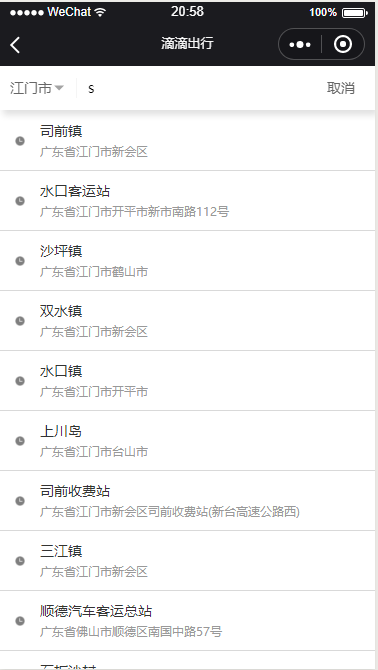
这里首先获取到state中的curCity,利用qqmapsdk.getSuggestion(),并将其参数region设置为curCity, 就可以进行地址模糊检索。选中地址时,利用qqmapsdk.geocoder()进行地址解析,得到目的地的相关数据,再将数据通过mapMutations存入state中
computed: {
...mapState([
'curCity'
])
}模糊检索
qqmapsdk.getSuggestion({
keyword: value,
region: this.curCity,
success: (res) => {
this.addresses = res.data
}
})点击地址时,解析地址保存数据
choosePlace(item){
//item.address详细地址
//item.title简短语义化地址
console.log(item)
qqmapsdk.geocoder({
address: item.address,
success: (res) => {
this.saveEndPosition([res.result.location.lat, res.result.location.lng])
this.saveDestination(item.title)
this.goBack()
},
fail: (err) => {
console.log(err)
}
})
}mapMutations
methods: {
...mapMutations({
saveDestination: 'SET_DESTINATION',
saveEndPosition: 'SET_END_POSITION'
})
} 选择城市
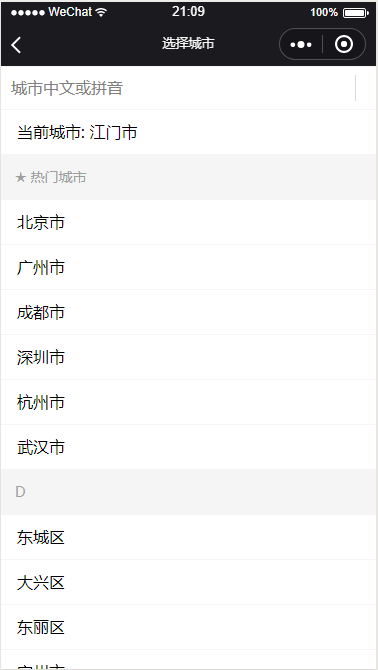
这里的样式是按照现在的滴滴小程序实现,只要将选中的城市保存在state中的curCity就好了,搜索功能暂未开发。获取城市列表数据用到了腾讯地图的api中的qqmapsdk.getCityList()。这里其实就是数据的过滤与处理,先初始化了一个空对象temp_citys,然后根据城市的拼音的首字母的大写建立key,对应value为一个数组,数组里面包含所有以这个拼音字母开头的城市,最后将temp_citys赋值给this.cityList
qqmapsdk.getCityList({
success: (res) => {
const result = res.result[1]
let temp_citys = {} //使用temp_citys 避免频繁改动data里面的数据
for (let i = 0; i < result.length; i++) {
let key = result[i].pinyin[0].charAt(0).toLocaleUpperCase()
if (!temp_citys[key]) {
temp_citys[key] = []
}
temp_citys[key].push(result[i].fullname)
}
this.cityList = temp_citys
}
})其他的一些页面就不提了,感兴趣的小伙伴可以去看下源码
使用mpvue的一些好处
可以使用vuex
使用vuex进行状态管理,可以更方便地构建复杂应用。这里讲一个调试小技巧,使用createLogger(),使用之后就可以在Console中清楚地看到state的变化
在store下的index.js
import Vue from 'vue'
import Vuex from 'vuex'
import state from './state'
import mutations from './mutations'
import createLogger from 'vuex/dist/logger'
Vue.use(Vuex)
const debug = process.env.NODE_ENV !== 'production'
export default new Vuex.Store({
state,
mutations,
strict: debug,
plugins: debug ? [createLogger()] : []
})使用vuex时要记得在对应页面的main.js引入store,并将store赋给Vue.prototype.$store
例如:
import Vue from 'vue'
import App from './wait.vue'
import store from '../../store/index'
Vue.prototype.$store = store
const app = new Vue(App)
app.$mount()组件化开发
使用mpvue组件化开发更加方便,也方便将组件移植到其他项目中,完整的Vue开发体验,提高了代码复用性。
例如 这里的search-bar:
<template>
<div class="search-bar">
<div class="text-location" @click.stop="chooseCity">{{curCity}}</div>
<input type="text"
v-model="search"
class="input-location"
placeholder="你在哪儿上车"
placeholder-style="color:#cccccc">
<div class="cancel-location" @click.stop="cancel">取消</div>
</div>
</template>
<script type="text/ecmascript-6">
import {debounce} from '../utils/index'
export default{
props: {
curCity: {
type: String,
default: '暂无'
}
},
data(){
return {
search: ''
}
},
methods: {
cancel(){
this.$emit('cancel')
},
clear(){
this.search = ''
},
chooseCity(){
this.$emit('chooseCity')
}
},
watch: {
search(newVal){
debounce(() => {
this.$emit('search', newVal)
}, 500)()
}
}
}
</script>这里为了节流处理,引入了debounce()函数
可以使用Async/await
原生小程序已经支持Promise,但对于async/await还不支持,利用mpvue框架我们可以封装一些异步函数,避免回调地狱。
例如:网络请求
export function request(url, method = 'GET', data, header = {}) {
return new Promise((resolve, reject) => {
wx.showLoading({title: '玩命加载中...'})
wx.request({
url: baseUrl + url,
method,
data,
header: {'Content-Type': 'json'},
success: function (res) {
if (res.statusCode === 200) {
resolve(res.data)
} else {
showToast('发生未知错误!')
reject(res.data)
}
},
fail: function () {
showToast('获取数据失败!')
},
complete:function () {
wx.hideLoading()
}
})
})
}
async getInitData(){
const res = await request('/comments')
...
}使用mpvue的一些坑
年轻人比较冲动,愣头青,说多了都是眼泪,官方文档一定要好好看,首先提一下常规的一些坑。
嵌套列表渲染
只是需要注意一点,嵌套列表渲染,必须指定不同的索引!
示例:
<!-- 在这种嵌套循环的时候, index 和 itemIndex 这种索引是必须指定,且别名不能相同,正确的写法如下 -->
<template>
<ul v-for="(card, index) in list">
<li v-for="(item, itemIndex) in card">
{{item.value}}
</li>
</ul>
</template>regionchange
bindregionchange 事件直接在 dom 上将bind改为@regionchange,同时这个事件也非常特殊,它的 event type 有 begin 和 end 两个,导致我们无法在handleProxy 中区分到底是什么事件,所以你在监听此类事件的时候要同时监听事件名和事件类型
<map
@regionchange="functionName"
@end="functionName"
@begin="functionName">
<map>
事件触发问题
举个简单的例子,slider组件有一个bindchange属性,它是完成一次拖动后触发的事件,那么如果我们想取对应的值该怎么操作。
在小程序中我们使用:
event.detail
但在 mpvue中要这样写:
event.mp.detail
map闪动
动态更新markers时,地图会闪动,导致无法移动地图,这个可是一个大坑
地图组件bindregionchange的bug:
https://github.com/Meituan-Dianping/mpvue/issues/401
原因:mpvue在更新某个属性时都会更新整个data, 在数据量比较大的情况下效率低下,而且频繁改动data里面的数据也会导致卡顿问题
解决方案:每次更新数据时使用脏检查优化
但是个人觉得这种直接改源码的方式还是比较妖怪的,于是找到了另一种办法
<map class="map-didi"
id="map-didi"
@regionchange="regionChange"
@begin="begin"
@end="end" >
</map>let touchTimeStamp = 0
regionChange(){
},
begin({timeStamp}){
touchTimeStamp = timeStamp
},
end({timeStamp}){
// 加入时间判断
if (timeStamp - touchTimeStamp > 50) {
this.mapCtx.getCenterLocation({
success: (res) => {
reverseGeocoder(qqmapsdk, res).then(res => {
this.saveStartPlace(res.result.address)
this.saveFormattedStartPlace(res.result.formatted_addresses.recommend)
})
const lon_distance = res.longitude - this.longitude
const lat_distance = res.latitude - this.latitude
// 更新当前位置坐标
this.longitude = res.longitude
this.latitude = res.latitude
//判断屏幕移动的距离,如果超过阀值
if (Math.abs(lon_distance) >= 0.0022 || Math.abs(lat_distance) >= 0.0022) {
//刷新附近的车
this.updateCars()
//刷新等待时间
this.minutes = getRandomNum(3, 12)
}
}
})
}
}为了防止map不断地触发begin,end事件导致data频繁更新,这里做了双重判断,当end事件的触发时间减去start事件的触发时间超过一个设定的时间,当中心点移动的距离超过一个阀值,我们才去更新data数据,这里其实相当于做了节流处理。
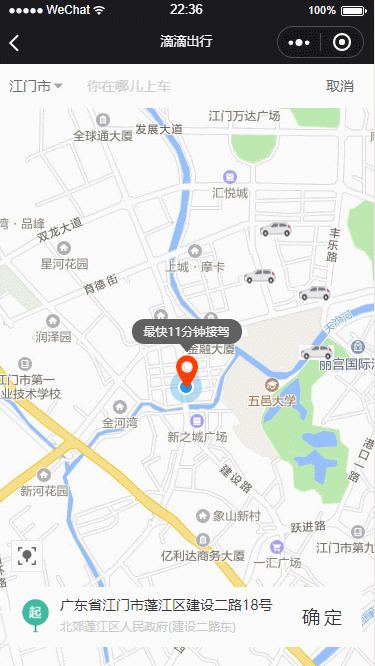
小程序的一些坑
常规的坑就不提了,这里说一下奇葩的坑。
cover-view的坑
cover-view覆盖在原生组件之上的文本视图,可覆盖的原生组件包括map、video、canvas、camera、live-player、live-pusher,只支持嵌套cover-view、cover-image。
只支持基本的定位、布局、文本样式。不支持设置单边的border、background-image、shadow、overflow: visible等
那如果我们想在cover-view里实现单边的border应该怎么做?
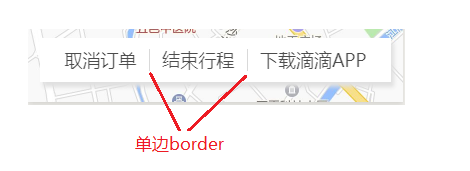
可以在cover-view里再增加一个宽度1px的cover-view来模拟单边border
<cover-view class="footer-bar">
<cover-view class="text" @click.stop="cancel">取消订单
</cover-view>
<cover-view class="right-border"></cover-view>
<cover-view class="text" @click.stop="endTrip">结束行程
</cover-view>
<cover-view class="right-border"></cover-view>
<cover-view class="text">下载滴滴APP</cover-view>
</cover-view>.footer-bar {
padding: 0 12px;
display: flex;
align-items: center;
height: 44px;
color: rgba(0, 0, 0, .7);
background: #fff;
font-size: 0;
.text {
flex: 1 1 auto;
display: inline-block;
height: 22px;
line-height: 22px;
text-align: center;
font-size: 18px;
}
.right-border {
flex: 0 0 1px;
height: 22px;
width: 1px;
background-color: #d9d9d9;
}
}map组件的层级最高,如何在map组件上做出阴影效果呢?
实现方式其实也是类似,利用cover-image添加一张能覆盖在map组件之上的图片来模拟阴影
具体实现请看这篇文章: juejin.cn/post/684490…
项目地址
欢迎小伙伴来一起交流学习,喜欢项目的话请给颗小星星
总结
学习之路漫漫,不必急于求成。技术日新月异,掌握不变的核心才是王道。不断打磨作品的感觉也挺好的,如果以后有机会的话再慢慢完善。
另外本人目前大三,准备暑假后找实习,有没有广州的大大愿意收留下我。。。
友情链接
滴滴一夏, 小程序专车来了 https://juejin.cn/post/6844903616961052679
网络请求request的坑 www.cnblogs.com/huangenai/p…
mpvue + vuex 开发微信小程序 mapState、mapGetters不可用问题